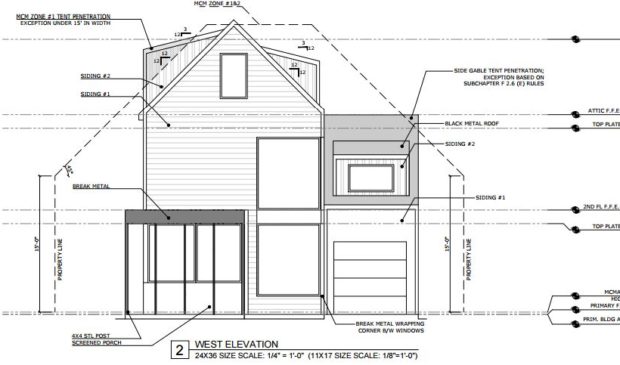West Line home plans unsettle landmark commission
Tuesday, May 30, 2017 by
Elizabeth Pagano Despite some strong indications that it might be fruitless, Historic Landmark commissioners voted May 22 to postpone a recommendation for a new Old West Austin home in the hopes that something different might be built.
Last year, the Historic Landmark Commission took several months and about six hearings to contemplate the demolition of the 1915 bungalow at 812 Theresa Ave. In the end, swayed by testimony that the home’s condition was beyond repair, commissioners allowed the demolition to move forward. The property is within the West Line Historic District. Because it is a National Register Historic District, the commission does not control what can be built there, though it can issue recommendations on the design: a pair of contemporary two-story houses with two-story auxiliary dwelling units in the back.
The postponement would allow time for the applicant to confer with the neighbors about the design before the commission issues its recommendation. Thomas Joseph, who was representing the home’s owner as the builder, explained that the property was sold to a new owner after the demolition permit was obtained. However, it was clear that the previous battle had made an impression.
“If it’s just a recommendation, I would request you make your recommendation now. I’m more interested in your input and what the requirements are. I’m less interested in outside input, just given the history of the property. There was a lot of neighborhood input and involvement,” said Joseph, who said he had no desire to do any further neighborhood engagement.
Commissioners voted unanimously to postpone the case to allow the owner to discuss future plans with the neighborhood. Rosemary Merriam, chair of the Old West Austin Neighborhood Association Zoning Committee, asked for a postponement in order to allow time to work with the builder on the design. She told the commission the owner had not responded to previous attempts at communication. Merriam also clarified that the neighborhood uses design standards from the secretary of the interior for the National Register District.
Joseph said they had tried to work within the neighborhood character by designing homes that have a large front porch and gabled roof. He explained that the current housing market favors more contemporary designs and that, too, was reflected in the current plans.
“Do you really think this is in keeping with the neighborhood?” asked Commissioner Terri Myers. She noted that the commission had been assured that would be the case when the demolition was approved.
“Yeah, I do,” responded Joseph, who maintained the neighborhood was eclectic. He said that the home that had previously been on the property had not been individually landmarked, and with its approved demolition, its relevance had “flown by the wayside.”
“Moving forward, there isn’t a very clear, specific requirement to meet the subjective standards of ‘keeping with the neighborhood,’” he said. “We feel the design is very much in keeping with the neighborhood based on what is currently being built there and the other things that have been allowed to be built in the neighborhood.”
Joseph said that, as an expert in the real estate industry, he felt that the neighborhood has transitioned to a more contemporary build. “That’s kind of the nature of the neighborhoods, the nature of all these redeveloping neighborhoods, and so the best we can kind of do is meet in the middle,” he said.
Chair Mary Jo Galindo said that she found it hard to trust Joseph’s assessment of the neighborhood after reviewing the street on Google Maps and noticing all the homes on Theresa Street appeared to be compatible with the historic district. She also asked him to speak with the project’s architect to better understand the neighborhood’s design standards.
Commissioner Blake Tollett voted in support of the postponement, despite his belief that Joseph “has no desire to listen to us or the neighbors.”
“This thing about the changing neighborhood – it’s changing because people are ramming this stuff in and it’s all about the dollars,” said Tollett.
The Austin Monitor’s work is made possible by donations from the community. Though our reporting covers donors from time to time, we are careful to keep business and editorial efforts separate while maintaining transparency. A complete list of donors is available here, and our code of ethics is explained here.
You're a community leader
And we’re honored you look to us for serious, in-depth news. You know a strong community needs local and dedicated watchdog reporting. We’re here for you and that won’t change. Now will you take the powerful next step and support our nonprofit news organization?






